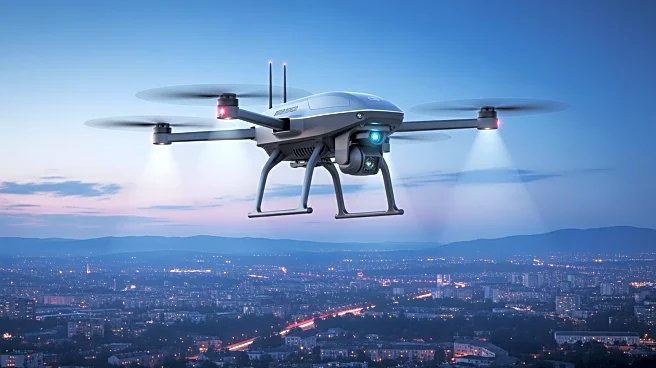What's Happening?
Immigration and Customs Enforcement (ICE) is deploying advanced surveillance technologies to identify and monitor individuals, raising significant privacy concerns. These technologies include facial recognition apps and iris scanning tools that allow
agents to identify individuals in the field. ICE has also acquired software that provides access to extensive location-based data and revived a contract with a company that produces spyware capable of hacking into cell phones. The Trump administration aims to increase deportations to a million annually, leveraging these technologies to identify and locate noncitizens. Privacy advocates and some Democratic lawmakers have expressed concerns about the erosion of privacy rights and the lack of regulatory oversight. Democratic Senator Edward Markey has called for ICE to cease using facial recognition technology, citing its potential to chill free speech and undermine democracy.
Why It's Important?
The deployment of these surveillance technologies by ICE has significant implications for privacy rights and civil liberties in the United States. The ability to identify individuals instantly through facial recognition and other biometric data could lead to increased surveillance of both immigrants and U.S. citizens. Privacy advocates warn that these tools could be used for mass surveillance, potentially infringing on constitutional rights. The lack of transparency and oversight in the use of these technologies raises concerns about their potential misuse. The Trump administration's aggressive stance on immigration enforcement and willingness to push legal boundaries further exacerbate these concerns. The expansion of surveillance capabilities could have a chilling effect on public protests and free speech, as individuals may fear being identified and monitored.
What's Next?
Democratic lawmakers, led by Senator Markey, have renewed their calls for ICE to halt the use of facial recognition technology and provide answers regarding its deployment. The public has an opportunity to comment on a proposed rule by the Department of Homeland Security that would expand the agency's ability to collect biometric data from noncitizens and their U.S. citizen relatives. Legal groups have filed lawsuits seeking records about ICE's use of spyware technology. The ongoing debate over privacy rights and surveillance is likely to continue, with potential legal challenges and public scrutiny of ICE's practices.
Beyond the Headlines
The use of advanced surveillance technologies by ICE highlights broader ethical and legal concerns about government surveillance and privacy rights. The potential for these technologies to be used beyond immigration enforcement, such as in policing and monitoring public protests, raises questions about the balance between security and civil liberties. The expansion of surveillance capabilities could lead to long-term shifts in societal norms regarding privacy and anonymity in public spaces. The debate over the use of these technologies underscores the need for robust regulatory frameworks and oversight to protect individual rights.















